Transplant patients have to take a long list of medications, which can be a hassle and difficult to remember.
After a transplant, immunosuppressants or antirejection drugs have to be taken religiously for life. The medicines prevent the body from attacking and rejecting the organ, which it recognises as foreign.
People whose organs fail likely suffer from other diseases as well. For instance, kidney transplant patients usually have high blood pressure and cholesterol, so they would also be taking medicine for those conditions.
Given the importance of taking medicines, a group of transplant specialists at Singapore General Hospital (SGH) undertook a study to find out how well patients abided by instructions on doing this, and if they didn’t, the reasons for not doing so.
“Our study aimed to measure medication adherence among solid organ [such as the kidneys, liver and the heart] transplant recipients at SGH – for example, the extent to which patients take their medications as recommended. This involves taking the correct dose, the correct strength, and at the correct timing and number of times a day.”
Ms Khoo Sher Ri, Senior Pharmacist, SGH, and the first author of the study.
The study found a 54 per cent adherence rate. This is better than the 20-51 per cent rate found in other international studies, but it still means that nearly half the survey participants weren’t taking their medications as prescribed. The team recruited 206 SGH kidney (158) and liver (48) transplant patients. They were between 27 and 75 years of age, or a median age of 56 years.
No single cause could be found for the participants not taking their medicines as prescribed, but the most frequent reasons cited were forgetting, feeling hassled, and having difficulty in remembering to take their medications, Ms Khoo said.

Transplant patients can be prescribed up to 18 or an average of nine medications a day, taken at various times of the day, and in different ways. “Because of drug interactions, the patients may need to schedule them at different times of the day,” said Dr Lee Puay Hoon, Senior Principal Clinical Pharmacist, SGH, and the senior author of the study.
For instance, one medicine might have to be taken on waking up at 6am, another at 7am and at 10am, and so on. Such a complex regimen can be difficult to remember, Dr Lee added.
Patients tended to be careful about taking their immunosuppressants but were less so for drugs like statins, which are taken for controlling cholesterol levels.
“They think that they do not have to take their chronic condition medications. But uncontrolled hypertension and uncontrolled diabetes put stress on the kidneys, so not controlling their chronic conditions can affect the health of the kidneys in the long run,” said Ms Khoo.
Following the findings, the transplant team’s work procedure has been enhanced to ensure that transplant patients don’t neglect their medication regimen. For instance, when they return for their regular reviews, they are asked more closely about how they are taking their medications.
The importance of taking all their prescribed medicines and following the instructions to the letter would be driven home to them at their regular reviews. If they are found to be neglecting their medication regimen, these patients will be monitored more closely.
At the same time, pharmacists also work with physicians to simplify patients’ drug regimens, like prescribing single medications with a longer duration of action instead of taking two different drugs.
Medications can sometimes help reverse organ rejection, especially when detected early. But when a transplanted organ is lost, patients may not easily get another chance of a second transplant.
“Whether they get a second transplant depends on whether they are suitable for a second transplant, and whether we can find donors.”
Dr Terence Kee, Senior Consultant, Department of Renal Medicine, SGH, and a member of the research team.
He is also the hospital’s Clinical Director, Transplant Centre, and Programme Director, Renal Transplant Programme.
“Kidney transplantation is not a cure. It’s just another form of treatment. You have to take medicines for the long term just like any other disease,” said Dr Kee, noting that in many cases of late organ rejections, it is because patients don’t take their medications.
This story was first published in Singapore Health, Jan-Feb 2018 issue.
